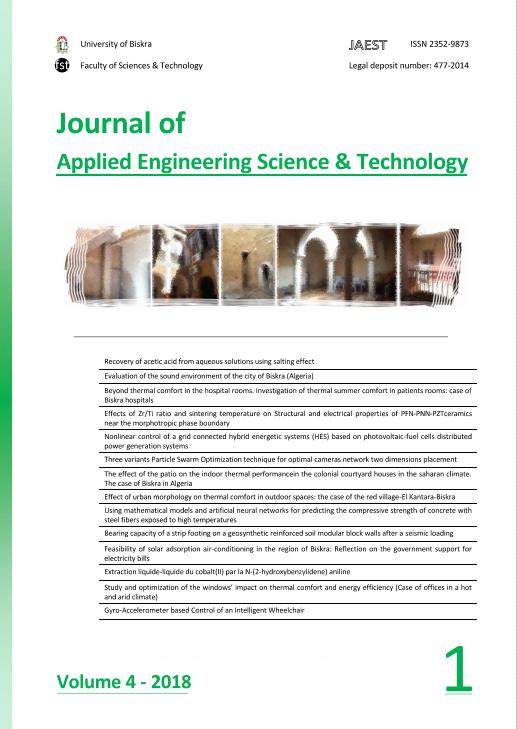Nonlinear control of a grid connected hybrid energetic systems (HES) based on photovoltaic-fuel cells distributed power generation systems
Abstract
This paper presents a discrete-time integral sliding mode control for a grid connected hybrid energetic systems (HES) based on photovoltaic-Solid oxide fuel cell (SOFC) for distributed power generation systems. The proposed HES systems employ solid oxide fuel cell (SOFC) and photovoltaic panels as main sources, supercapacitors as complementary sources, and controlled DC-DC boost converter and three levels NPC inverter. A maximum power point tracking (MPPT) control is used in order to maximize the power of the photovoltaic system. The proposed control consists of a power management grid interface inverter transferring the energy from the hybrid sources into the grid by controlling the main utility grid and the common DC voltage active and reactive power. The obtained simulation results show the effectiveness and robustness of the proposed control strategy. Keywords: Hybrid Energetic Systems (HES), Solid Oxide Fuel Cell (SOFC), Photovoltaic (PV), Sliding Mode Control, Maximum Power Point Tracking (MPPT), Grid power management.
J. Appl. Eng. Sci. Technol. (JAEST - ISSN 2352-9873) is a peer-reviewed quarterly journal dedicated to the applied engineering sciences and technology. The JAEST provides immediate open access to its content on the principle that making research freely available to the public supports a greater global exchange of knowledge.
There is no submission or publication fee for papers published in the JAEST.
Authors who publish in the JAEST agree to the following terms:
- Authors retain copyright and grant the journal right of first publication with the work simultaneously licensed under a Creative Commons Attribution License that allows others to share the work with an acknowledgement of the work's authorship and initial publication in the JAEST.
- Authors are able to enter into separate, additional contractual arrangements for the non-exclusive distribution of the journal's published version of the work (e.g., post it to an institutional repository or publish it in a book), with an acknowledgement of its initial publication in the JAEST.
- Authors are permitted to post their work online (e.g., in institutional repositories or on their website) prior to and during the submission process, as it can lead to productive exchanges, as well as earlier and greater citation of published work (See The Effect of Open Access). Any such posting made before acceptance and publication of the Work shall be updated upon publication to include a reference to the JAEST and a link to the online abstract for the final published Work in the Journal.






